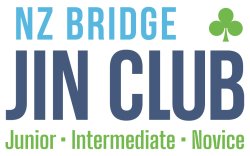
All News
Daily Bridge in New Zealand

For Junior, Intermediate, Novice players…and others! It’s Fri Day
Day
Not in my Beginners’ Notes!
The solution to today’s problem may surprise those who have been following
NZ Bridge’s Beginners’ Notes to the letter. So, we had better justify this answer! Firstly, then, the problem:


|
|
West |
North |
East |
South |
|
|
|
|
1 ♥ |
|
2 ♦ |
? |
|
|
We are playing 4-card majors, meaning that when partner opens a major suit at the 1-level, they may have as few as a 4-card suit. What then do we bid, if anything, with our 5-count? Only East-West are vulnerable.
Our North hand may seem hard to value. It only has 5 hcp and of that ![]() K is of dubious value depending on whether our partner has the
K is of dubious value depending on whether our partner has the ![]() A or
A or ![]() Q or neither. Yet, when we have a trump fit, and we certainly have that, we can count three extra points for a one-card suit and one for a two-card suit. So, even if we discounted any points for the
Q or neither. Yet, when we have a trump fit, and we certainly have that, we can count three extra points for a one-card suit and one for a two-card suit. So, even if we discounted any points for the ![]() K, we can count 3 for a singleton, 1 for our doubleton and 2 for
K, we can count 3 for a singleton, 1 for our doubleton and 2 for ![]() Q. We have therefore at least 6 points and thus can bid.
Q. We have therefore at least 6 points and thus can bid.
Yet, the bid we should make is not 2![]() or even 3
or even 3![]() but 4
but 4![]() ! You may have learnt that that bid shows an opening hand. That’s great initially but in time we find we can usually change suit with such a hand and support partner later. Reserve a direct jump to game for a hand with lots of hearts (usually 5 or more) and less than 10 hcp, often as here considerably less.
! You may have learnt that that bid shows an opening hand. That’s great initially but in time we find we can usually change suit with such a hand and support partner later. Reserve a direct jump to game for a hand with lots of hearts (usually 5 or more) and less than 10 hcp, often as here considerably less.
The idea is it is great when we can make our contract but even if we do not, and the opposition can make their own game, they may not risk bidding at such a high level, especially if they are vulnerable. A small minus score for our side may well be a great result.
Let’s see what would happen if we jumped to 4![]() with the above North hand:
with the above North hand:
|
South Deals |
|
||||||||||||||||||||||||||||||
|
|
|
|||||||||||||||||||||||||||||
|
|||||||||||||||||||||||||||||||
|
West |
North |
East |
South |
|
|
|
|
1 ♥ |
|
2 ♦ |
4 ♥ |
? |
|
Would East try 4![]() or would they pass? As they are vulnerable, pass seems a very reasonable choice. Against 4
or would they pass? As they are vulnerable, pass seems a very reasonable choice. Against 4![]() , West would lead
, West would lead ![]() Q. South wins to play
Q. South wins to play ![]() AK. They have no losers in trumps or diamonds and only one in spades. Can you see what the key card to the success of this contract is?
AK. They have no losers in trumps or diamonds and only one in spades. Can you see what the key card to the success of this contract is?
The answer is ![]() J. South needs to play clubs to lose just 2 tricks,
J. South needs to play clubs to lose just 2 tricks, ![]() A and
A and ![]() K. South must lead a club from the South hand and when West plays
K. South must lead a club from the South hand and when West plays ![]() 7 insert
7 insert ![]() 10 from dummy hoping West holds
10 from dummy hoping West holds ![]() J. When East wins
J. When East wins ![]() K, the news is good. Say East returns a diamond. South wins and plays a second club and whether West takes their ace now or on the next round, there are only 2 club tricks for the defence. Contract made: +620, a great result for North/South, with a combined 21 hcp.
K, the news is good. Say East returns a diamond. South wins and plays a second club and whether West takes their ace now or on the next round, there are only 2 club tricks for the defence. Contract made: +620, a great result for North/South, with a combined 21 hcp.
Let’s say, though, East bid 4![]() . South seems to have plenty of potential for tricks. So, they can double. They lead
. South seems to have plenty of potential for tricks. So, they can double. They lead ![]() A and West, the dummy hand, shows their singleton heart. North-South can score 5 tricks in one of two ways. Either South plays
A and West, the dummy hand, shows their singleton heart. North-South can score 5 tricks in one of two ways. Either South plays ![]() 9 at trick 2, thus establishing a club trick for the defence before East can set up their diamond suit. Alternatively, South can play 3 rounds of diamonds, North ruffing the third round with
9 at trick 2, thus establishing a club trick for the defence before East can set up their diamond suit. Alternatively, South can play 3 rounds of diamonds, North ruffing the third round with ![]() K. This sets up 2 trump tricks for the defence. +500 (or even + 200 if only down 1 doubled) is better for North-South than scoring +170 in a heart part-score, or even worse, letting their opponents make or only go one down in 3
K. This sets up 2 trump tricks for the defence. +500 (or even + 200 if only down 1 doubled) is better for North-South than scoring +170 in a heart part-score, or even worse, letting their opponents make or only go one down in 3![]() .
.
After bidding 4![]() , it would be unusual for North to bid again. They have bid to as high a level as they are prepared to go and bid there quickly.
, it would be unusual for North to bid again. They have bid to as high a level as they are prepared to go and bid there quickly.
“Fast Arrival” is the name of the game..well here, bidding to the “game” level very quickly, to make it as hard for our opponents as possible. Try this approach next time your partner opens 1 of a major suit and you have a hand the same style to our North hand above. There is a risk with such a bid but the potential gain of bidding quickly with not much but a fistful of trumps makes that risk very worthwhile. Such bidding makes for lively and exciting auctions, too.
Richard Solomon
Go Back View All News Items


